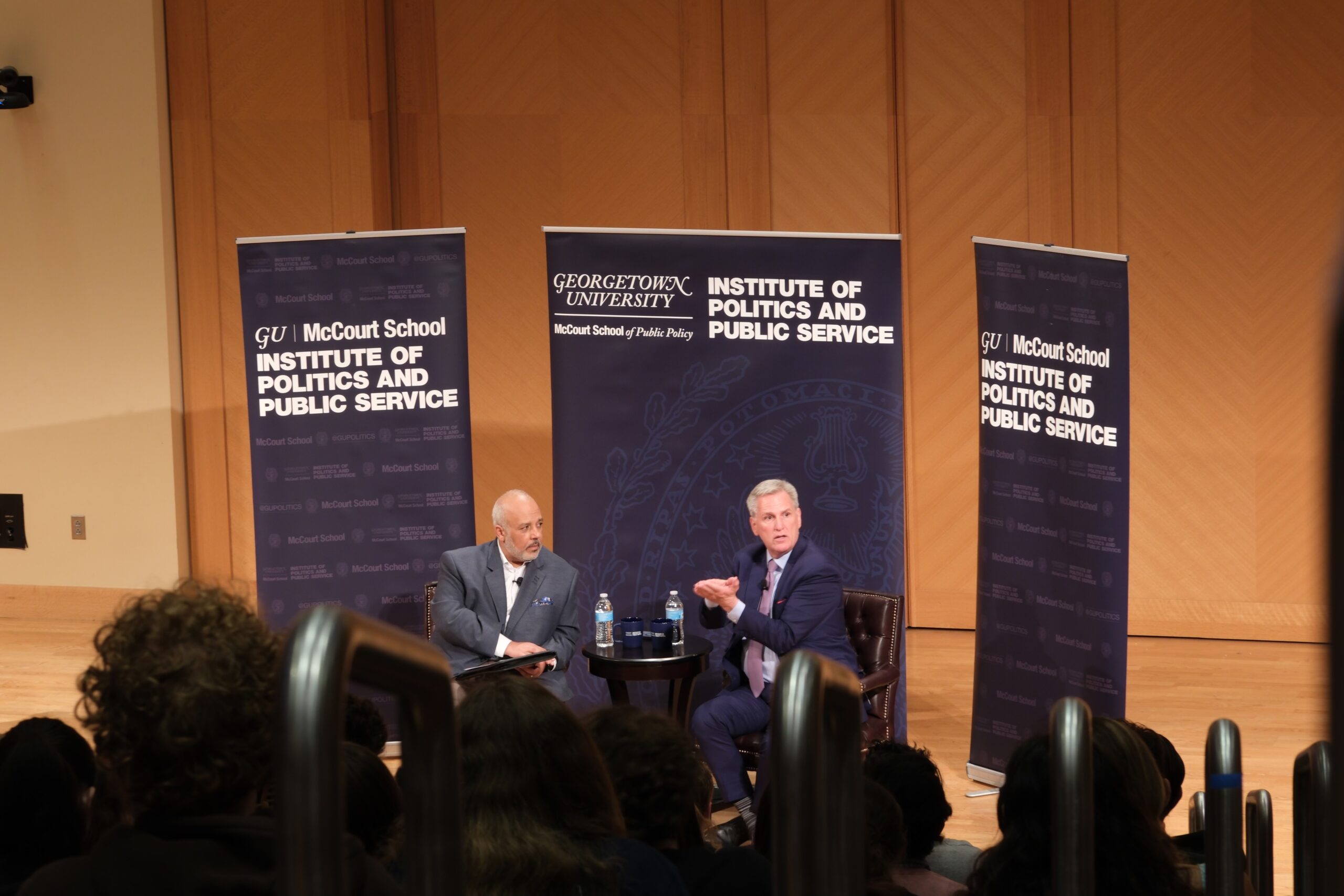Former Speaker of the House Kevin McCarthy spoke in Lohrfink Auditorium on April 9 in an event hosted by Georgetown’s Institute of Politics and Public Service (GU Politics). During the event, titled, “How strong is our democracy?” he spoke about a range of topics including, his time as Speaker of the House, the Jan. 6 riots and the 2020 election.
Throughout the event, McCarthy made statements containing factual errors or exaggerations, several of which were challenged by moderator and GU Politics executive director Mo Elleithee (SFS ’94), as well as audience members.
Here’s a fact check:
On comparing Hillary Clinton’s comments in 2016 to Donald Trump refusing to concede the 2020 election
When Elleithee asked McCarthy why he voted to decertify the results of the 2020 election, McCarthy argued that the combination of COVID’s complications to the election as well as past precedent informed his decision. He then referenced both the 2000 challenge to the Bush/Gore race in Florida and “Hillary Clinton saying she won” in 2016. When Elleithee pushed back on the comparison of Hillary’s comments to Trump’s refusal to concede, McCarthy doubled down.
What was said:
McCarthy: “I would say when Hillary still pushed it too…”
Elleithee: “She had conceded.”
McCarthy: “No, she’ll say today — I’ll read you quotes where she said, ‘you can run the best campaign, you can win — you can get the most votes and still not win.’”
This is a false equivalency. Hillary Clinton conceded on Wednesday, Nov. 9, 2016, the morning after the election. Former President Trump refused to concede the 2020 election until Jan. 7, 2021, the day after a violent insurrection on his behalf, led by his supporters, during attempts to certify the election results.
Clinton’s statement about receiving more votes than Trump in the 2016 election is also correct. Clinton won the popular vote, with over 2 million more votes than Trump. However, Trump received more electors in the electoral college, thus winning him the presidency.
On the Jan. 6 Committee
When speaking about Jan. 6, McCarthy argued that then Speaker of the House Nancy Pelosi had “politicized” Jan. 6 by not allowing him as House Minority Leader to appoint Republicans to the Jan. 6 Committee — a 9/11 style committee designed to investigate the riots.
What was said: “If you truly believed that it was a bad event, why wouldn’t you as Speaker of the House, with everything else you’ve ever done, let the minority leader appoint Republicans to investigate, just as you got to appoint the Democrats.”
This is untrue and heavily exaggerated. Then Speaker of the House Nancy Pelosi did reject two of McCarthy’s five proposed committee members, but she did so due to concerns regarding Reps. Jim Jordan and Jim Banks’ prior comments on the insurrection and the 2020 election. Pelosi gave McCarthy the opportunity to replace them, but McCarthy then withdrew all of his proposals, including the three Republican congressmen, Reps. Troy Nehls, Rodney Davis, and Kelly Armstrong, Pelosi had already approved.
Pelosi later independently chose two Republicans to serve on the committee, Reps. Liz Cheney and Adam Kinzinger, who were censured by McCarthy and the Republican Party for participating. McCarthy also publicly refused to comply after being subpoenaed by the Jan. 6 Committee.
On jail time for Jan. 6 rioters
What was said: “Almost four years later, why are they sitting in jail and not having the ability to go to court? Are they being treated fairly?”
Rioters involved with Jan. 6 did have the ability to go to court and continue to do so. Over 800 criminal cases have been brought against defendants who participated in the Jan. 6 riots. Defendants have had fair jury trials for crimes ranging from misdemeanors to attempts to disrupt congressional proceedings. While supporters of the Jan. 6 riots, including former President Trump, have referred to former rioters and current defendants as “hostages” who shouldn’t be put to trial, federal judges and courts across America have resoundingly disagreed.
On Donald Trump being removed from primary ballots in Maine and Colorado
What was said: “Is it a threat to democracy if you take someone off the ballot just because you don’t like them? I think that’s a big threat to democracy. Do you know that’s been happening this election?”
This is untrue. Colorado and Maine’s Supreme Courts didn’t decide to remove Trump because of any personal vendettas, instead the removals were based on rulings that Trump violated the 14th amendment in his support of the Jan. 6 insurrection. Regardless, Trump was put back on primary ballots in those states after the U.S. Supreme Court ruled that only congress, not states, can remove a national candidate from the ballot.







